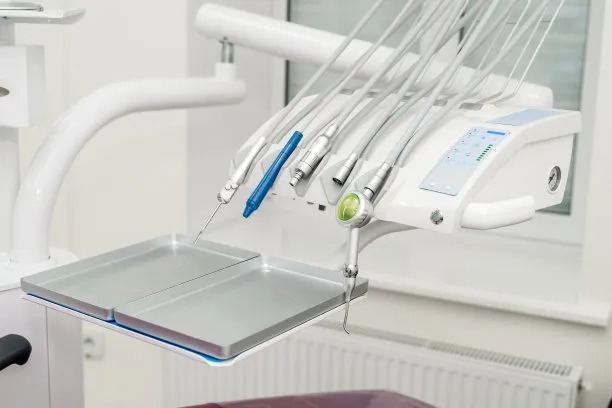Summary: Root canal treatment (RCT) is a vital procedure in dentistry designed to save an infected or damaged tooth and restore its function. This article outlines essential guidelines and precautions for performing RCT safely and effectively, ensuring optimal dental health for patients. We explore four key areas: pre-treatment assessment and consultation, aseptic techniques and instrumentation, procedural techniques and follow-up care, and patient education and recovery. Following these guidelines will not only enhance the success rate of the treatment but also minimize potential complications, resulting in better patient outcomes and overall satisfaction.
1. Pre-Treatment Assessment and Consultation

Before embarking on any medical procedure, thorough assessment and consultation are paramount. For root canal treatments, this typically involves a comprehensive dental examination and imaging of the affected tooth. Dentists need to evaluate the extent of infection or damage and determine the most suitable treatment plan. Factors such as patient history, current medications, and any allergies must also be carefully reviewed.
A detailed consultation with the patient is crucial for addressing any concerns or questions they may have. Educating the patient about the procedures benefits and any potential risks can alleviate anxiety and ensure they are fully informed. Additionally, discussing alternative treatment options helps patients make more confident decisions regarding their dental health.
In some cases, pre-treatment procedures like teeth whitening or addressing other oral health issues may be required. Ensuring that the patients overall oral health is optimized before RCT can lead to a smoother and more successful procedure.
2. Aseptic Techniques and Instrumentation
Maintaining a sterile environment during root canal procedures is critical to prevent infections and ensure patient safety. Dentists must adhere to strict aseptic protocols, which include sterilizing all instruments used during the treatment. Failure to do so not only jeopardizes the procedure but can also lead to serious complications and the need for additional treatments.
The selection of appropriate instruments is another crucial aspect. Endodontic files, for instance, should be of high quality, allowing for effective cleaning and shaping of the root canal system. Regular calibration and assessment of tools will ensure they function effectively during the procedure, further enhancing treatment success.
Furthermore, utilizing modern technology, such as an operating microscope, can significantly improve the precision of the treatment. Enhanced visualization leads to better identification of canal anatomy, reducing the chance of missing additional canals or tissues, which can contribute to treatment failure.
3. Procedural Techniques and Follow-Up Care
Implementing standardized procedural techniques is essential for achieving safe and effective root canal treatment outcomes. This includes proper access cavity preparation, thorough cleaning and shaping of the canal, and efficient obturation to seal the cleaned canal space. Each step must be executed with high precision to ensure the infection is adequately managed and the tooth remains functional.
Post-procedure care is equally important. Patients should receive detailed instructions regarding pain management, oral hygiene practices, and when to seek further dental attention. Routine follow-up visits should be scheduled to monitor healing and ensure that there are no complications post-treatment. Regular assessments help maintain the integrity of the treated tooth and patient satisfaction.
Additionally, in cases where a tooth does not respond positively to treatment, the dentist should be prepared to discuss options like retreatment or tooth extraction. Keeping an open dialogue with patients regarding possible outcomes keeps them engaged in their treatment journey and fosters a sense of trust.
4. Patient Education and Recovery
Educating patients about their role in the recovery process is a vital component of successful root canal treatment. Patients should be informed about symptoms to watch for post-treatment, such as prolonged pain or swelling, and encouraged to follow up with their dentist promptly if these occur. Understanding the healing process can help patients manage their expectations and reduce anxiety.
Providing clear oral hygiene instructions can greatly aid recovery. Patients should be encouraged to continue practicing good dental care, including regular brushing and flossing, to support optimal healing and maintain the integrity of the treated area. Lifestyle changes, such as avoiding hard foods during recovery, can also be beneficial.
Long-term education plays a significant role as well. Engaging patients in discussions about their overall oral health and the importance of preventive care will encourage them to visit their dentist regularly, further safeguarding against future dental issues.
Summary:
The guidelines and precautions outlined in this article are crucial for ensuring safe and effective root canal treatment. By focusing on pre-treatment assessments, aseptic techniques, procedural excellence, and patient education, dentists can significantly enhance the outcomes of RCT procedures. Prioritizing these areas will not only lead to improved patient satisfaction but also contribute to their long-term dental health.
This article is compiled by Vickong Dental and the content is for reference only
Vickong Dental
Vickong Dental is a large medical group established in Hong Kong in 2008 by professors from well-known medical universities in Guangdong and Hong Kong, as well as medical doctors from key national '985' universities (including Master's supervisors and senior professors). The chain of branches brings together expert dentists with PhDs and Master's degrees from Hong Kong and Mainland China, committed to providing high-quality dental treatment.
"Vickong Dental Practices the University Motto of 'Healing and Serving Society,' with a Stable Operation for Sixteen Years. It Has Been honored with Hong Kong Enterprise Leaders's Choice,' and is a Global Trusted Implant Center for the Nobel Implant System. Recommended by Hong Kong Metro Broadcast and Guangdong Television, it Serves Customers from Over Thirty Countries and Regions, Gaining the Trust and Favor of Citizens from the Guangdong-Hong Kong-Macau Greater Bay Area and Surrounding Cities.

Thousands of customers' unanimous praise
The most recognized and highly recommended dental service by customers in the Guangdong-Hong Kong-Macau Greater Bay Area
We Ensure You Receive Detailed Care and Attention Here
Hong Kong standards, Shenzhen prices, Your Trusted English-speaking dentists

Vickong Dental Medical-Grade Instrument Disinfection Process
Vickong Dental Medical-Grade Instrument Disinfection Process

Vickong Dental Chain: A Warm and Comfortable Environment for Treatment






Appointment Hours

Q&A
Why choose Vickong Dental?
Vickong Dental practices the university motto 「Medicine to Benefit Society」, with each branch bringing together highly qualified dentists with doctoral and master’s degrees from Hong Kong and the Mainland, and has maintained seventeen years of steady operation。Recipient of 「2024 Hong Kong Enterprise Leaders Brand」, 「2025 Hong Kong Enterprise Leaders Brand」, a Nobel Biocare Global Trusted Implant Center, and a brand recommended by Metro Radio Hong Kong and Guangdong TV。
To date, we have served customers from more than thirty countries and regions,earning exceptionally high word-of-mouth recognition and trusted recommendations from residents across the Guangdong-Hong Kong-Macao Greater Bay Area and surrounding cities
We have eight major branches in Zhuhai、Shenzhen,and a consultation and service assurance center in Hong Kong,so you can book a free consultation at any time for any questions,which is very reassuring.
If I do not accept the quotation after the CT scan, will I be charged??
No! As long as the actual treatment has not started, you will not be charged any fees.
Will there be any additional charges during the treatment process?
No, there won’t be any additional charges. Before treatment begins, we will clearly explain the treatment plan and its corresponding fees. Only after the patient agrees and signs the consent form will we proceed with the dental service.
Can I pay in Hong Kong dollars?
Yes. Vickong Dental accepts payment in Hong Kong dollars. The amount will be converted based on the exchange rate of the day, and the applicable rate will be clearly communicated to you in advance.
Can I reschedule my appointment at any time?
Yes. Please contact us via **WeChat** or **WhatsApp** as early as possible, providing your original appointment time and details, along with your preferred new date and time slot for rescheduling.













